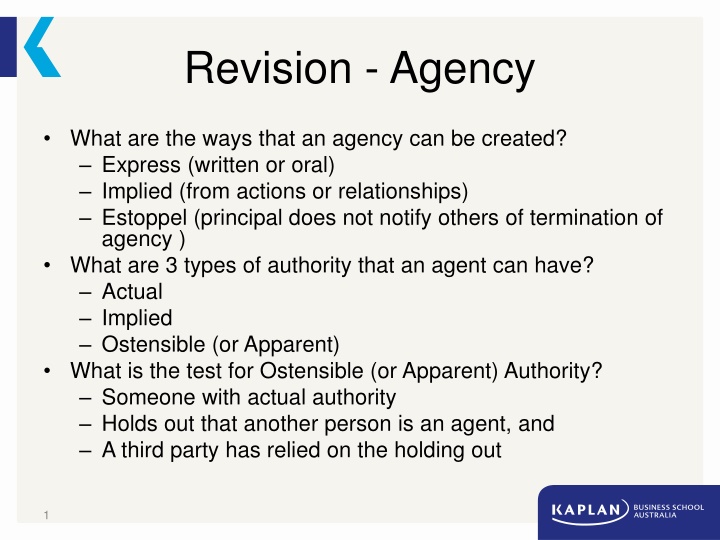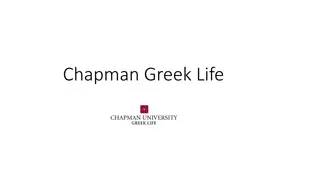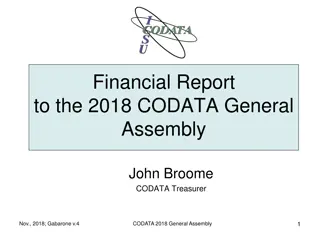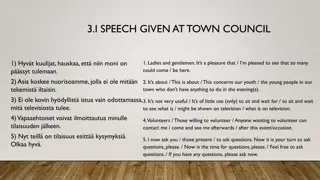
Agency and Partnership in Commercial Law
Explore the creation of agency, types of authority agents can have, and the definition of partnership in commercial law. Discover how agency is formed through express, implied, and estoppel means, and delve into the key elements that define a partnership. Uncover the nuances of ostensible authority and the essential characteristics of a legally recognized partnership.
Download Presentation

Please find below an Image/Link to download the presentation.
The content on the website is provided AS IS for your information and personal use only. It may not be sold, licensed, or shared on other websites without obtaining consent from the author. If you encounter any issues during the download, it is possible that the publisher has removed the file from their server.
You are allowed to download the files provided on this website for personal or commercial use, subject to the condition that they are used lawfully. All files are the property of their respective owners.
The content on the website is provided AS IS for your information and personal use only. It may not be sold, licensed, or shared on other websites without obtaining consent from the author.
E N D
Presentation Transcript
Revision - Agency What are the ways that an agency can be created? Express (written or oral) Implied (from actions or relationships) Estoppel (principal does not notify others of termination of agency ) What are 3 types of authority that an agent can have? Actual Implied Ostensible (or Apparent) What is the test for Ostensible (or Apparent) Authority? Someone with actual authority Holds out that another person is an agent, and A third party has relied on the holding out 1
Partnership BUS107 Commercial Law Lecture Ten 2
Small Group Discussion Do you agree with Roman philosopher Aristotle when he says: Friendship is essentially a partnership 3
Small Group Challenge Imagine you work for an online legal dictionary. Your job is to compose definitions for legal concepts without reference to any other dictionaries. The following three rules of composition offer some assistance: A concept can be defined by identifying and explaining its essential elements or characteristics; A concept can be defined by using examples to illustrate meaning; A concept can be defined by identifying what it is not. In groups, use the three rules of composition to define the legal concept of partnership. 4
Definition of Partnership Legal concepts should be defined with as much precision as possible to foster clarity of understanding and ease of application Just because a business describes itself as a partnership doesn t mean it is one it must fit the statutory definition A partnership is defined as the relationship between persons carrying on a business in common with a view to profit: see s.1 Partnership Act 5
Elements of Partnership Carrying on a business means an ongoing series of activities that are commercial in nature; not a hobby In common means the partners act for and on behalf of all the other partners With a view to profit means having an intention to generate profit, not operate a charity or sporting club: see s.1 Partnership Act 6
Further Definition of Partnership An arrangement between two or more people is not automatically a partnership just because they: own property together share gross returns share profit: see s.2 Partnership Act 7
Small Group Discussion Do you agree with English playwright William Shakespeare when he says: Love all, trust a few, do wrong to none 8
Small Group Challenge The Australian Chamber of Commerce and Industry (ACCI) has a serious problem The ACCI is worried by the results of a recent study revealing a lack of trust between partners as the primary reason for partnership dissolution. The study identifies a sharp rise in the incidence of the following activities: i) partners using partnership property for personal reasons; ii) partners taking business opportunities away from the partnership; iii) partners making secret commissions; iv) partners directly competing with the partnership business through other ventures. The ACCI seeks your advice. In groups, draft a code of conduct that would prohibit partners from engaging in these activities. 9
Trust Trust is reliance on the integrity of another person A person who holds a legal relationship of trust with another person is called a fiduciary A fiduciary owes the other person fiduciary duties Partners owe fiduciary duties to each other 10
Fiduciary Duties Fiduciary duties require partners to: Act in good faith Make full disclosure Account for benefits derived from dealing with the partnership Account for the use of partnership assets Not compete with the partnership 11
Partnership Contract A partnership contract will govern the relationship between the partners: see Bryant Bros v Thiele Where no partnership contract exists the Partnership Acts of each state impose a set of rules governing the relationship between the partners: see s.24 Partnership Act 12
Partnership Property Partnership property includes items: brought into the partnership as partnership property acquired on behalf of the partnership acquired in the course of running the partnership business see Harvey v Harvey 13
Harvey v Harvey HH was unable to farm his land due to ill health but wanted to keep it for his six-year-old son. The defendant's brother (HL) suggested that he and his sons work the land so HL s sons could gain farming experience and the land would still be available for HH s son. HL and his sons contributed labour but no capital HH provided stock and implements but no labour. Expenses, including the costs of improvements to the land, and profits were shared equally. HL & his sons made substantial improvements to the land There was no agreement as to how to account for improvements The land was not listed in the accounts as a partnership asset nor was it credited to HH s capital account The agreement ran for 20 years. 14
Harvey v Harvey The Court found that: The arrangement was clearly intended to be a partnership. The parties intended to keep the land for HH's son. If the land had become partnership property this objective would have been defeated. The land did not become an asset of the partnership. The cost of the improvements (with no allowance for labour) was to be deducted from HH's share of the partnership property. 15
Small Group Discussion Do you agree with Australian child psychologist Michael Carr-Gregg when he says: Parents should be held legally and financially responsible when their kids bully other kids 16
Small Group Challenge A member of the NSW Parliament has introduced a proposed amendment to the Companion Animals Act 1998. The amendment seeks to abolish section 25 which states: The member argues that no person should ever be liable for damages that they themselves did not cause. In groups, write a short letter to your local member explaining why they should vote against the proposed amendment. 17
Third party liability Liability for someone else's actions may arise because of the nature of the relationship you have with that person Partners are jointly liable for the debts and wrongful acts of the partnership: see ss.9-10 Partnership Act 18
Partnership Debts A debt is a partnership debt when: the transaction giving rise to the debt was conducted in the usual way the partnership is conducted the partner acted within either actual or ostensible authority in entering the debt on behalf of the partnership unless the third party knew the partner had no authority or did not know the partner was a partner: see s.5 Partnership Act 19
Wrongful Acts A partnership be liable for a wrongful act when: the wrongful act arose in the conduct of the ordinary business of the partnership: see s.10 Partnership Act even if the partner that committed the wrongful act was not authorised to act in that manner: see Polkinghorne v Holland & Whittington 20
Polkinghorne v Holland & Whittington The plaintiff entered into transactions on the advice of H, a member of a firm of lawyers He invested 5,000 in 2 companies and guaranteed the bank overdraft of a third company of which H was a director. H knew that each of the companies was financially unsound when he gave the advice The plaintiff lost the 5,000 and had to make payments under the guarantee 21
Polkinghorne v Holland & Whittington The court held: H had a duty to investigate the financial stability of the companies when advising the plaintiff and to disclose the facts within his knowledge to the plaintiff. This duty was owed by H in the ordinary course of the business of his law firm, and its breach meant his innocent partners were responsible for the loss of the client s money. H had not acted within the scope of his authority as a partner or within the ordinary course of business as a solicitor when he asked the client to sign the guarantee and so the innocent partners were not liable. 22
Small Group Discussion Do you agree with Iranian Grand Ayatollah Ali Khamenei when he says: The Americans are stuck in Iraq and have no way out. They are like a wolf whose tail has been caught in a trap 23
Small Group Challenge Tori Simpson, a senior partner in a large accounting firm, has an issue She has lost confidence in her firm s partners and wants to leave the partnership. She understands that partners are liable for the debts and liabilities of the partnership but wants to ensure she is not accountable for any debts and liabilities incurred by the partnership after she leaves. The other partners want her departure to remain confidential. Tori believes they are worried many of the firm s clients would go elsewhere if they knew she was leaving. She also thinks they want new clients to continue engaging the firm under the mistaken belief she is still a partner there. Tori seeks your advice. In groups, prepare an exit strategy for Tori that protects her from liability against future debts and liabilities of the partnership. 24
Leaving the Partnership Partners can continue to be liable for future debts and liabilities of a partnership even after they have left the partnership A person dealing with a partnership can treat ex-partners as current partners until they are notified of the departure A person who has not had dealings with a partnership can treat ex-partners as current partners unless they have notice of the departure e.g. it is advertised in a local newspaper and the Government Gazette: see s.36 Partnership Act 25
Expulsion of a Partner No majority of the partners can expel any partner unless a power to do so has been conferred by express agreement between the partners: see s.25 Partnership Act This means the partnership contract would have to include an expulsion provision 26
Termination of Partnership A partnership can be terminated by: agreement operation of law (e.g. bankruptcy, death, incapacity) supervening illegality court order After termination: The partners remain liable for partnership debts and wrongful acts committed or incurred prior to termination 27
Problem A partner has borrowed $600,000 on the partnership account to fund his own, separate business interests. He is also giving business advice to the firm s clients that he is not qualified or authorised to give. The firm could be held responsible for any client losses stemming from that advice. The partnership contract contains the following term: If any partner shall at any time commit a breach of any of their fiduciary duties the other partners may resolve by majority vote to expel the partner so in default. Discuss: 1. The elements required to meet the legislative definition of a partnership. 2. The fiduciary duties the rogue partner may have breached 3. What action the firm may take against the rogue partner for breach of fiduciary duties 4. The circumstances in which joint liability can arise for partnership debts and wrongful acts 5. The circumstances in which partners may expel their co-partners. 28




